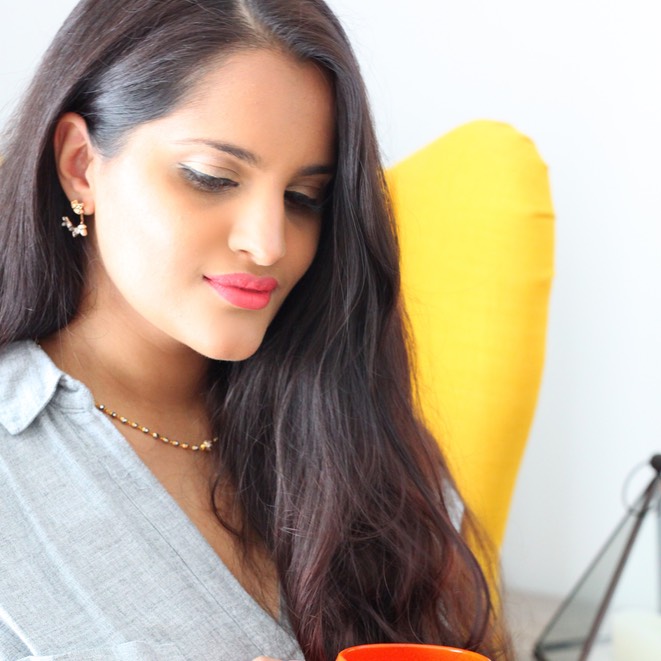
Inspired by beautiful ingredients, people and stories, Sanjana Modha-Patel aka Sanjana Feasts’ passion lies in creating Indian vegetarian soul food recipes for the way we eat today: Think grandma-style recipes with a hint of modernity. Her love of food began with the traditional South Asian dishes she ate growing up as a first-generation Brit. Very often it was daal (lentils), bhaat (rice), shaak (vegetable curry) and rotli (chapatis) on the menu. Her parents were African-born immigrants whose ancestors came from Gujarat, on the Kathiawar peninsula in western India. Her family’s culture has taught her to believe is that food transcends borders and that a bowl of good daal can fix anything.
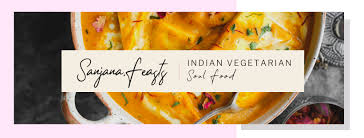
You specialise in vegetarian and vegan recipes. Have you always abstained from eating meat and if so, what are your reasons for doing so?
Since I was born. Our family has been vegetarian for generations, so it was never a conscious choice at first. It was one of those “we just are” things. Having said that, I’ve never had the desire to eat meat, not even as a rebellious teenager. When I was growing up, I was the only vegetarian in my school and most people thought it was weird. Not only was I one of the only non-white people in my school, I also had the “doesn’t eat meat, fish or eggs” label. Indian vegetarian food is a library of ingredients, flavours, textures and techniques. Coming from a family who loves to cook, we were never short of interesting and delicious food at home. When veggie home cooking was that good, I felt drawn towards deepening my passion for that instead of seeking out what was missing.
Which of your recipes have been the most popular during lockdown, both sweet and savoury, and why do you think people are more attracted to them right now?
Aloo Paratha and Gulab Jamun Cake. Carbs and mum’s home cooking is the pattern I’ve sensed. During uncertain times, we flock towards home comforts and the kitchen is almost always at the heart of a home. The majority of my recipes are Indian comfort foods, so it’s difficult to pinpoint exactly what’s different right now. Having said this, I’ve noticed an increased appetite for the more difficult to master Indian recipes. I like to think of them as “nani’s secret recipes” because they’re the sort of recipes most Indian grandmas will never share with you. She measures by the fistful, adding a pinch of this and a dash of that. It’s instinctual cooking from experience and soul. Beautiful to watch, but maddening if you actually want to know what actually goes into the pot. For example, Aloo Paratha are such a mainstay of the Indian kitchen. They’re as basic as it comes: flour, water, potatoes and a handful of spices. You think to yourself, “How hard can it be? My gran can do it with her eyes shut.” When you try, it’s a disaster — splitting dough, wonky shapes and burnt edges.
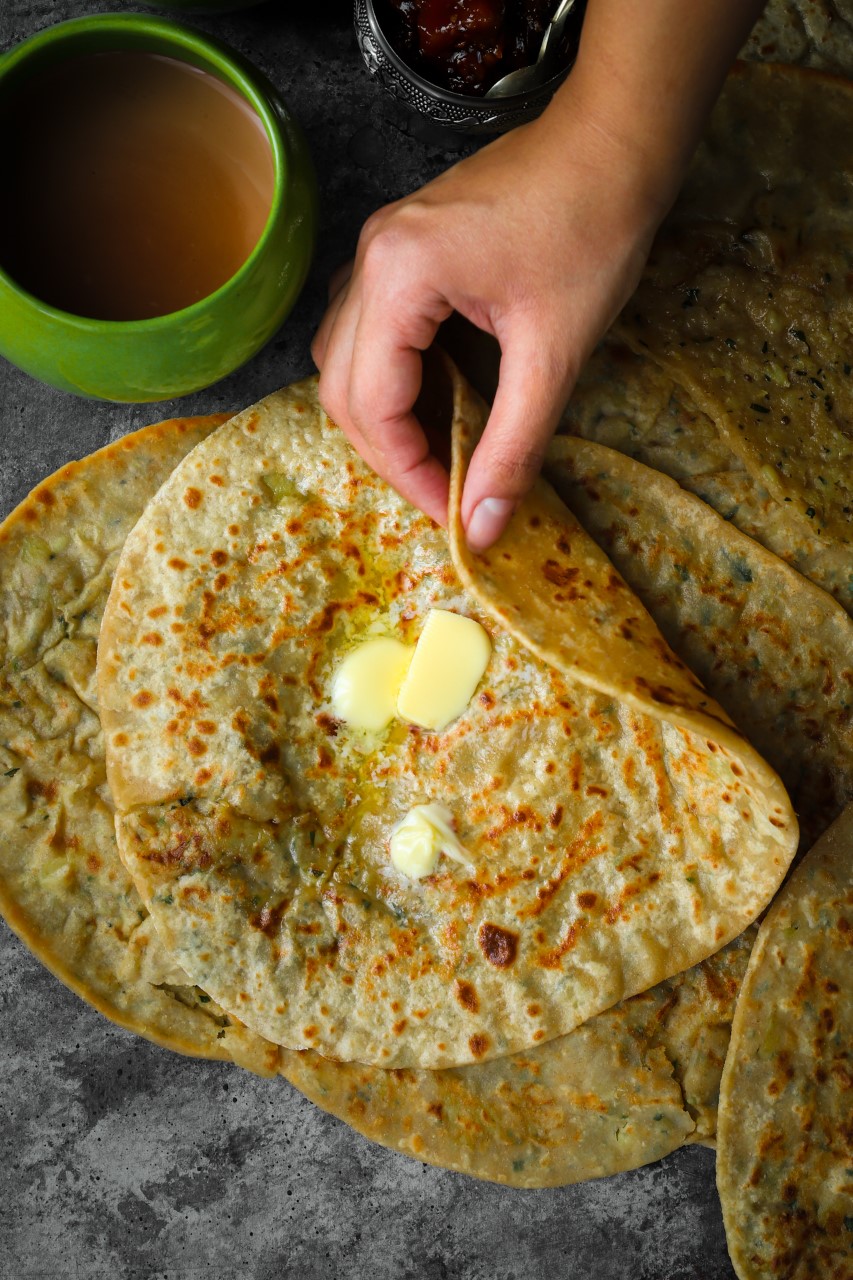
Aloo Paratha 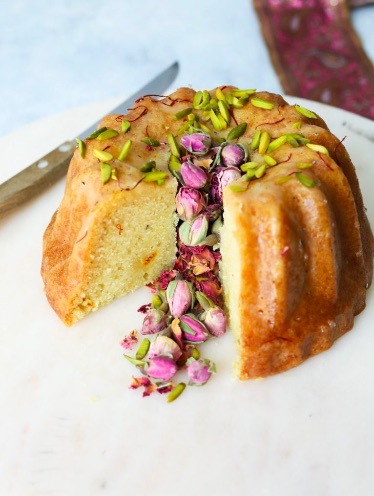
Gulab Jamun Cake
When you ask sweet grandma how she makes her famous potato-filled Paratha, she’ll tell you it’s the easiest thing in the world. But she’ll never actually give you her recipe. I think most will tell you it’s because their recipes are closely guarded secrets, but in my experience, it’s all a ruse (in the sweetest sense). From what I’ve seen, most don’t actually KNOW the true measurements because they’ve never measured anything. No scales. Heaping spoonfuls. No levelling ingredients off. Measurements by the handful. I can’t speak for everyone but this is what I’ve seen. I’ve asked my own aunties for recipes and have been given measurements in chai cups, eating spoons, pinches and beyond. My favourite is “enough water to bind” when making Indian bread. When they cook, they just know.
“My mission is to demystify Indian grandma cooking.”
Indian sweets are a tough nut to crack, so my Gulab Jamun Cake has been super popular. It’s a regular cake with all the flavours of the treasured Indian sweet; an otherwise lengthy and complicated dish made simple. Lockdown means people have the time to experiment and reconnect with the foods they love.
My mission is to demystify Indian grandma cooking, so I try to be thorough with my recipes. What I’ve found is that this gives people the confidence to try and recreate the meals of their childhood (dishes they never thought they could cook as well as their grandparents/parents/local restaurants). Guess what? They can and they’re doing a smashing job of it.
What have been the most memorable reactions to your recipes, either positive or negative?
I received a comment from an Indian lady in her late 50s who told me she had never in her life cooked daal. Not even once. It was something she’d always been apprehensive of making and serving, in fear that it wouldn’t be as good as her late mother’s version. Well, for her husband’s 62nd birthday, she finally made him a pot of daal for dinner. He loved it.
She used my recipe for Gujarati Daal Dhokli.
The most negative feedback has come from my toddler, Bodhi. I can spend hours cooking something delicious for him and he will straight up say “NO” in my face and ask for chips.
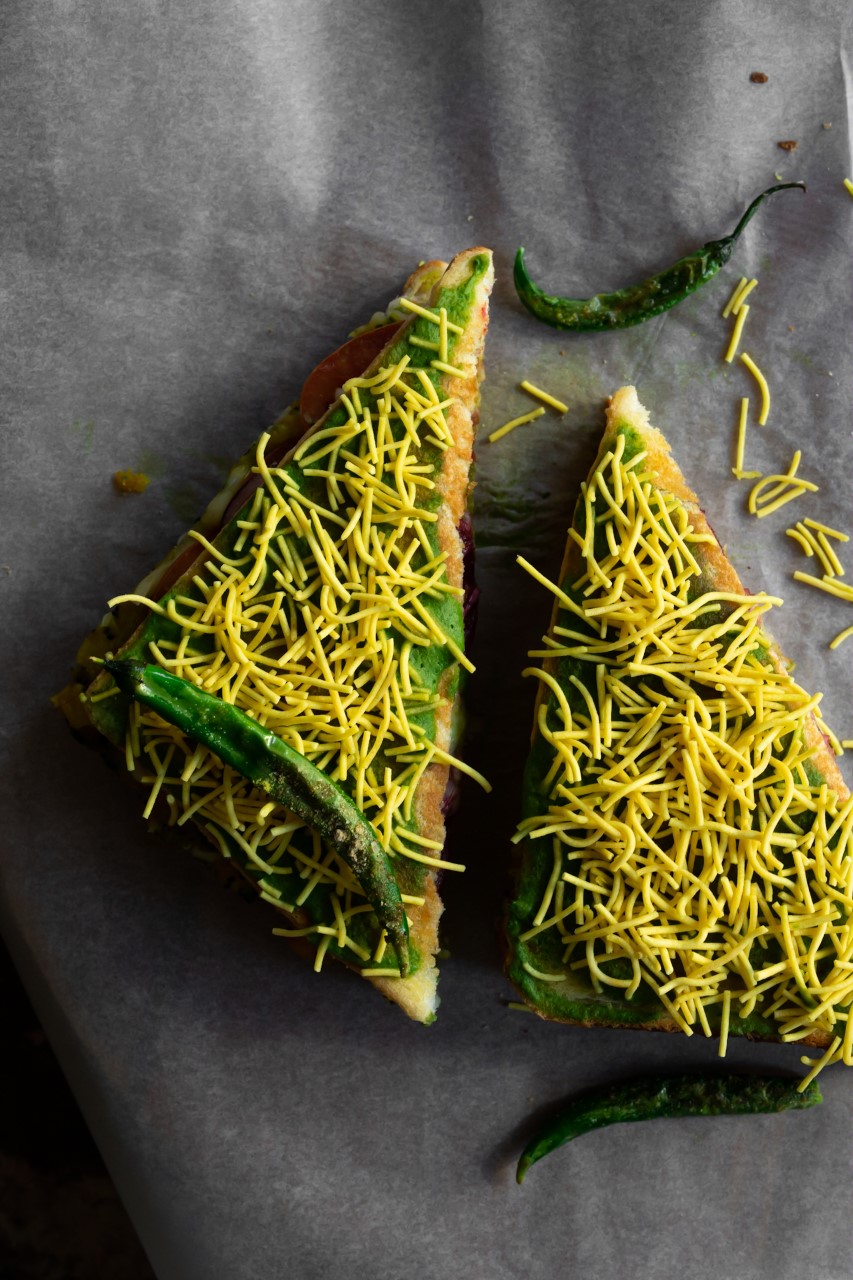
Mumbai Sandwich 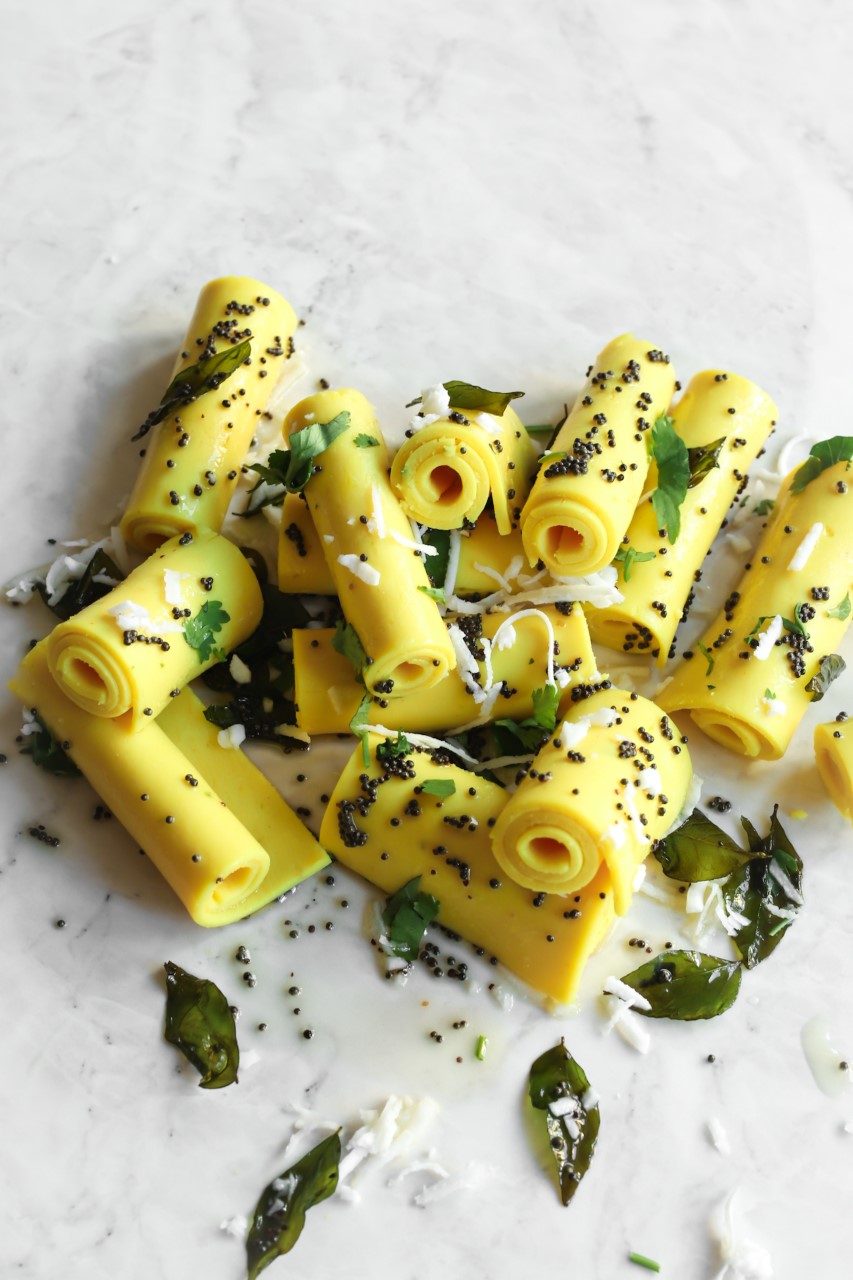
Khandvi
Of all your roles – recipe developer, food writer, menu consultant, stylist, photographer and video director – which one is your favourite and what does it mean to you?
The first one. Without that one, the others would cease to be. Recipe development – actual cooking in the kitchen – is the seed from which the shoots grow. I’ve been interested in cookery books ever since I could read. I grew up in a corner shop and read every cooking magazine on the shelf from the age of 8, up until I left home at 18. I would sit at the kitchen table and rifle through my mum’s cookbooks; I thought that’s what all kids did! Thinking about food, having new recipe ideas and cooking them has always been with me. I can’t remember a time when I wasn’t thinking about food.
You have amassed a sizeable social media following. What advice would you give to anyone looking to build an engaged online audience and utilise the various channels to promote their brand?
Don’t try to conform to someone else’s expectations of what you should be. One person’s yardstick is not a benchmark for your success. I’ve lost count of the number of times I’ve been told what I do is “too niche” to be marketed to a western audience. Allow that. Find your niche and feed it. If your passion is comfort food, don’t go and make smoothie bowls and bliss balls because that’s what everyone else is doing. Similarly, if those things are your passion, then go and do just that. Strive to be you and your people will come.
And please stop obsessing over follower numbers. It could be at 1M and you’ll still never think it’s enough. Instead, look at how you can spread a little more light in people’s lives through doing what you love. What’s the point in spending hours on something if you find no happiness in it? I spend 4 days a week working on new content; things would be pretty bleak if I wasn’t finding joy in it.
“Strive to be you and your people will come.”
Make the platform work for you, not the other way around. It’s a mindset shift: how can you use it to share more of what you love? Don’t be there to do more of what’s already there and still expect to grow an audience. Build trust with people by being present, being human and by being the most authentic version of yourself. The main reason we stop doing something we love is because we forget our love of doing it for enjoyments sake and replace it with the desire to be good at it.
I had a message from someone who wanted advice on how to make simple Gujarati dishes for her 89 year-old grandmother who lives alone during the COVID-19 outbreak. Her grandmother was very traditional, very used to being independent and, all of a sudden, had been unable to enjoy simple pleasures, like shopping for fruit and veg. We worked together to create a list of traditional vegetable curries, daals and savouries would freeze well so she was always able to eat what she enjoyed, despite not being able to shop. That’s been one of the most rewarding things I’ve done all year.
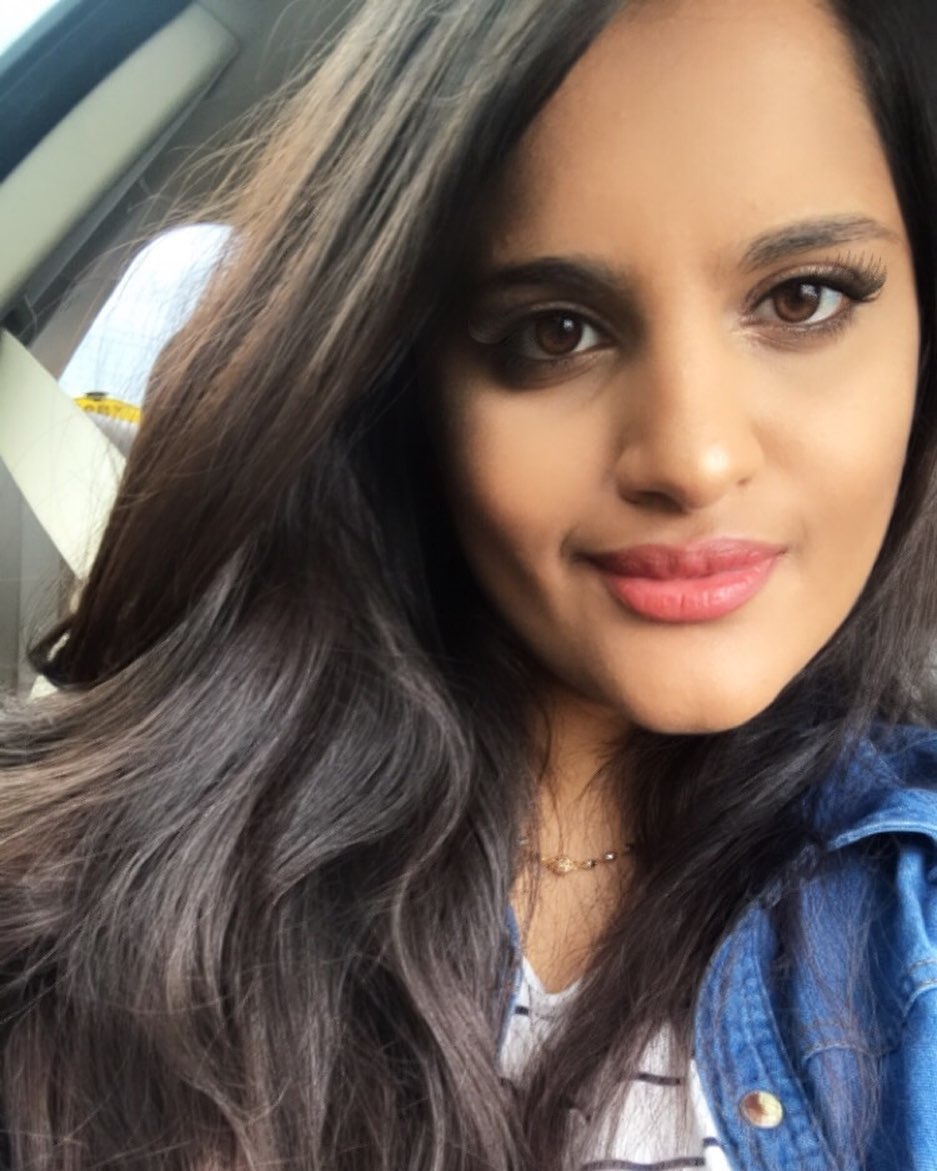
Sanjana 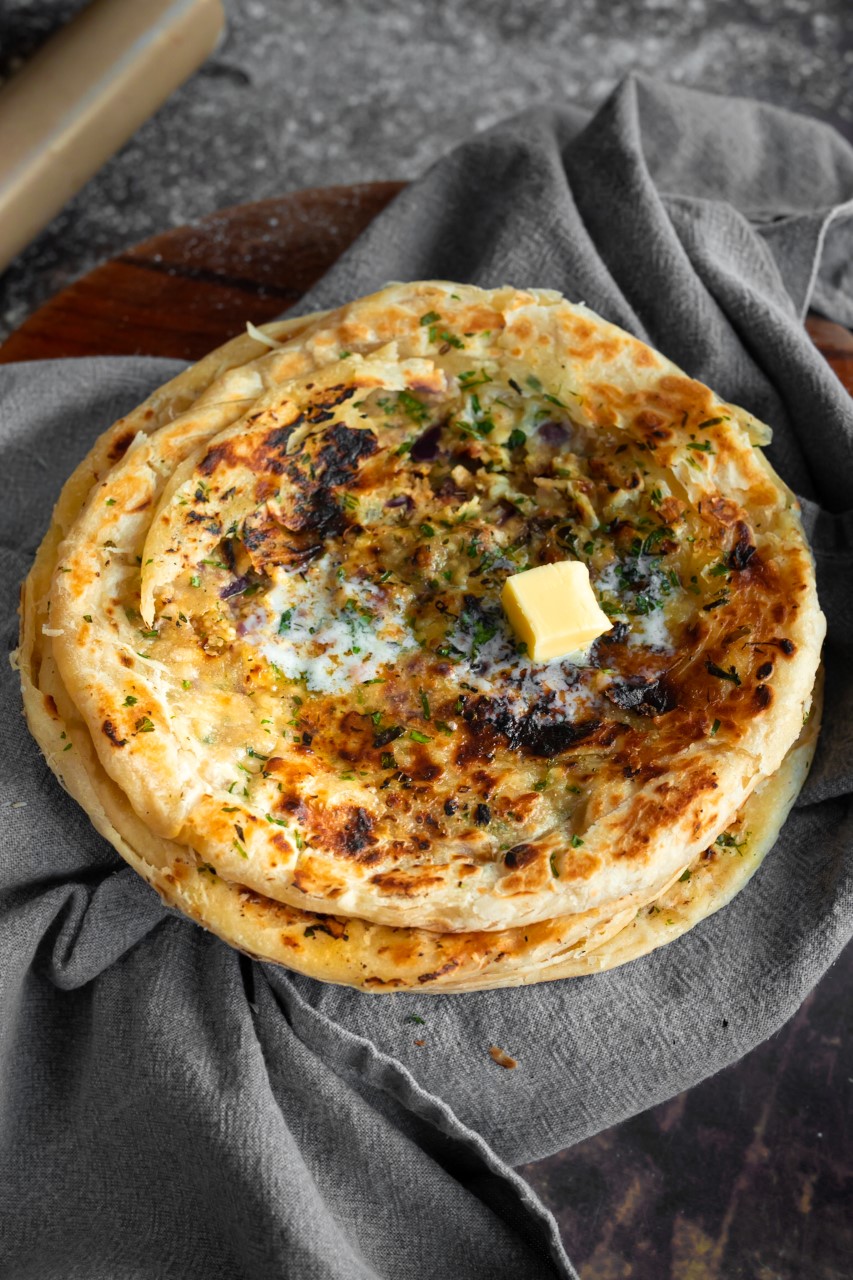
Paneer Kulcha
Instagram can heavily influence our attitude towards food and the way we interact with it. What’s your view on this powerful platform and what do you like and dislike about it?
Take everything you see on Instagram with a pinch of salt. It’s a carefully-curated showreel of the highlights in people’s lives. It’s not their everyday reality, it’s what they want you to see — even the bits that feel “real” are put there for a reason. That being said, it’s also a brilliant tool for connecting with people who share your interests. Learn from it what you can and find the things that speak to you. But don’t for one second believe that you’re not “living your best life” if you’re not indulging in a diet craze, wearing specific clothes, travelling to beautiful places or working out in a certain way. It might look like I’m all about the food, but at 1am, I’m hungry for memes.
You often feature your young son on your Instagram Stories, but are careful to cover his face every time. Why did you decide to keep his identity anonymous?
I thought long and hard about this one. Honestly, there’s no deeper rationale behind it other than this: I’m choosing to share part of myself on social media. I think it’s an excellent tool for creating and maintaining relationships, sharing passions and showcasing talents. My profile is public. I’m an adult making a conscious decision to do that. He’s two; that’s little. Maybe when he’s older, social media will be something he chooses to do. But until then, he can sit it out.
If you were invited to speak about a topic totally unrelated to food, what would it be and what about it appeals to you?
There’s nothing I know better than movies starring Will Ferrell. I love to laugh. Silliness speaks to my soul. I’m also a huge fan of the late Rik Mayall and his ‘90s BBC comedy series Bottom (alongside Ade Edmondson). I love to watch comedies and stand-up when I need a bit of an escape. But I’d probably speak about something to do with harnessing the power of digital platforms to build your personal brand.
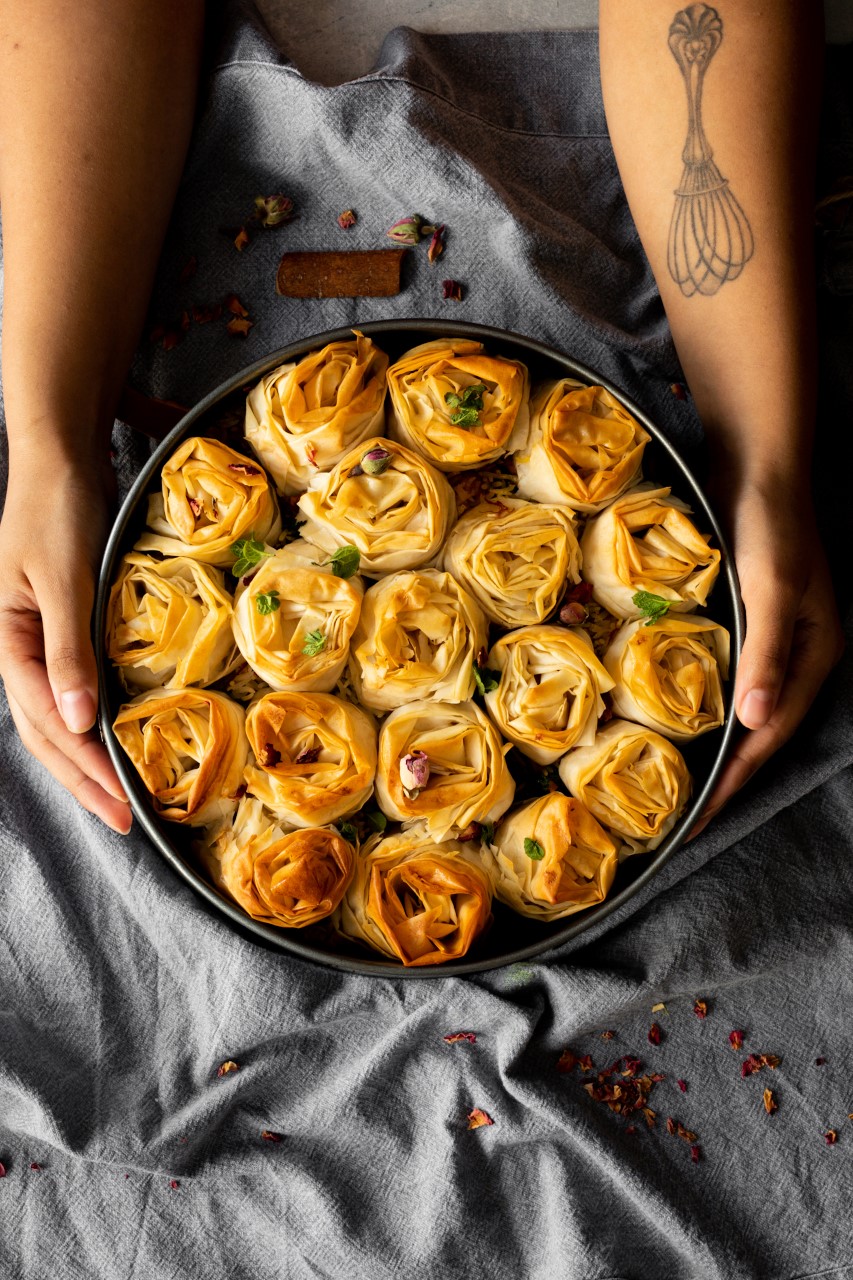
Ruffled Biryani 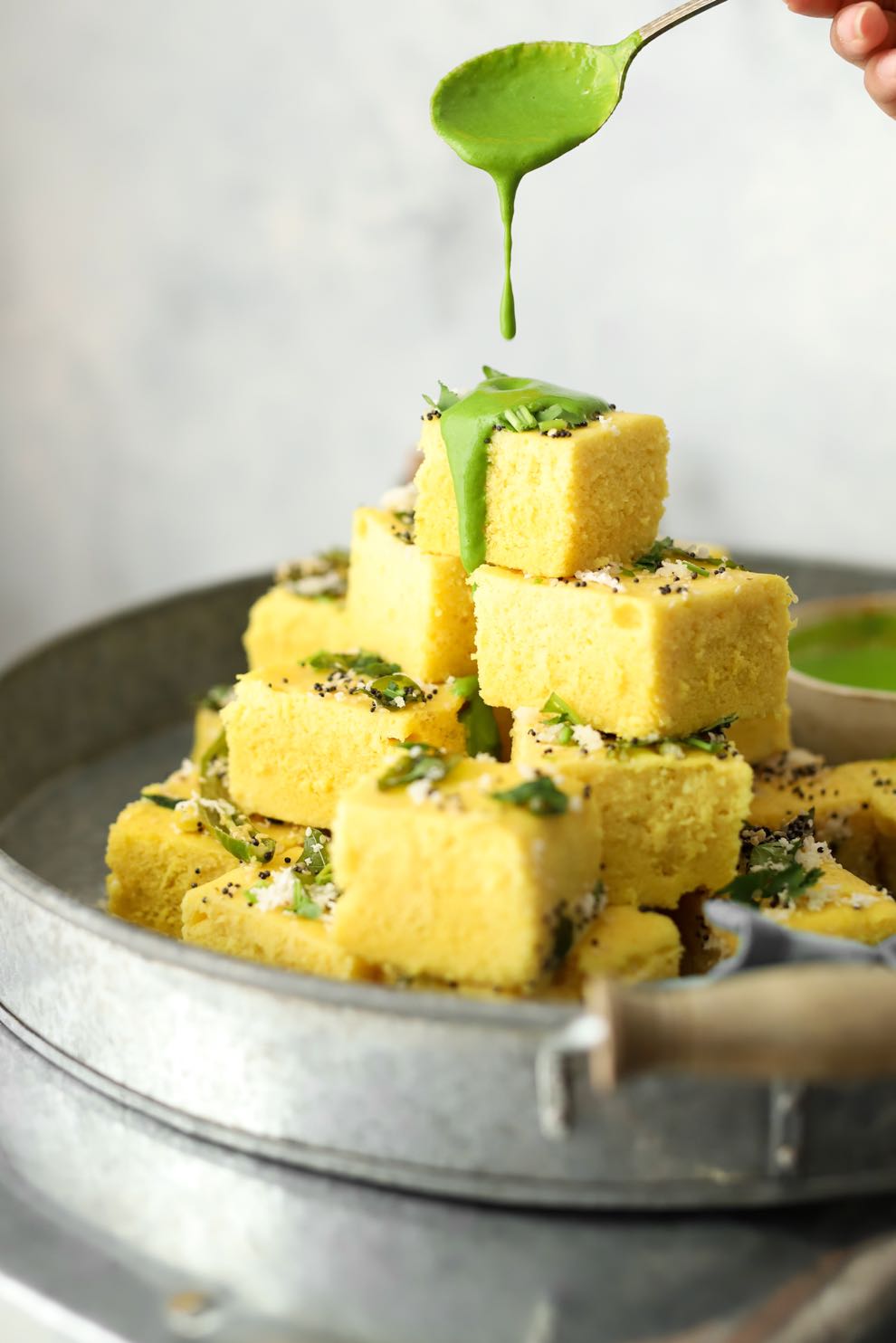
Dhokla
What steps have you taken to protect your mental health to cope with life in lockdown and how have they helped you?
I’ve immersed myself in what I love in the hope that it may help people, as well as keeping me in tune with myself. I watch enough news to keep up with the latest government advice, but nothing more. I’ve been committed to regularly producing new content to share in the hope that it helps people who want to cook during this time, either for enjoyment, distraction or just because they’re hungry. Food is fuel, not only on a physical level, but also on a deeper, more emotional one.
What do you like the most about yourself and for what reason? And the least?
I’m a constant worrier, which is what I like the least. I will obsess over the smallest details and lose myself in them. In a way, this is what makes me somewhat of a perfectionist and good at what I do — which is something I do like about myself. I’m working on maintaining a reasonable balance between satisfaction in presenting something I’m proud of and the anxious meltdowns I’m so prone to.
What have been the best and worst phases of your life and which lessons have you learned from them, if any?
I was two months into first-time motherhood when I lost my job of nine years. My son immediately became the light of my life when he was born, but my world turned upside down in such a short amount of time. Being a new parent is a challenge, but losing a reliable income so quickly into it is even more so. Before he was born, my job (which was also food related) was a huge part of my life; I had a two-hour commute into London and two hours back out again, five days a week. I slumped into a state of purposelessness for almost two years, flitting from one business idea to another whilst trying my best to be “a good mum”. All I felt during that time was emptiness. The guilt from feeling like a bad mother and wife for not being happy with my life when I had a family around me was eating me up. Physically, I stopped doing and emotionally, I stopped being.
“I realised I derived my energy from teaching people to cook.”
It was only at the beginning of 2020 that I began to find my feet. After spending the final few months of 2019, learning to cook Indian sweets with my mum (the daughter of a confectioner), I realised I derived my energy from teaching people to cook. It sounds insignificant and also incredibly obvious given I’d been food blogging for 10 years by that point, but it was only in that moment it clicked that what I love most about what I do is knowing I’ve helped someone eat something great that day. I’ve always been a people pleaser.
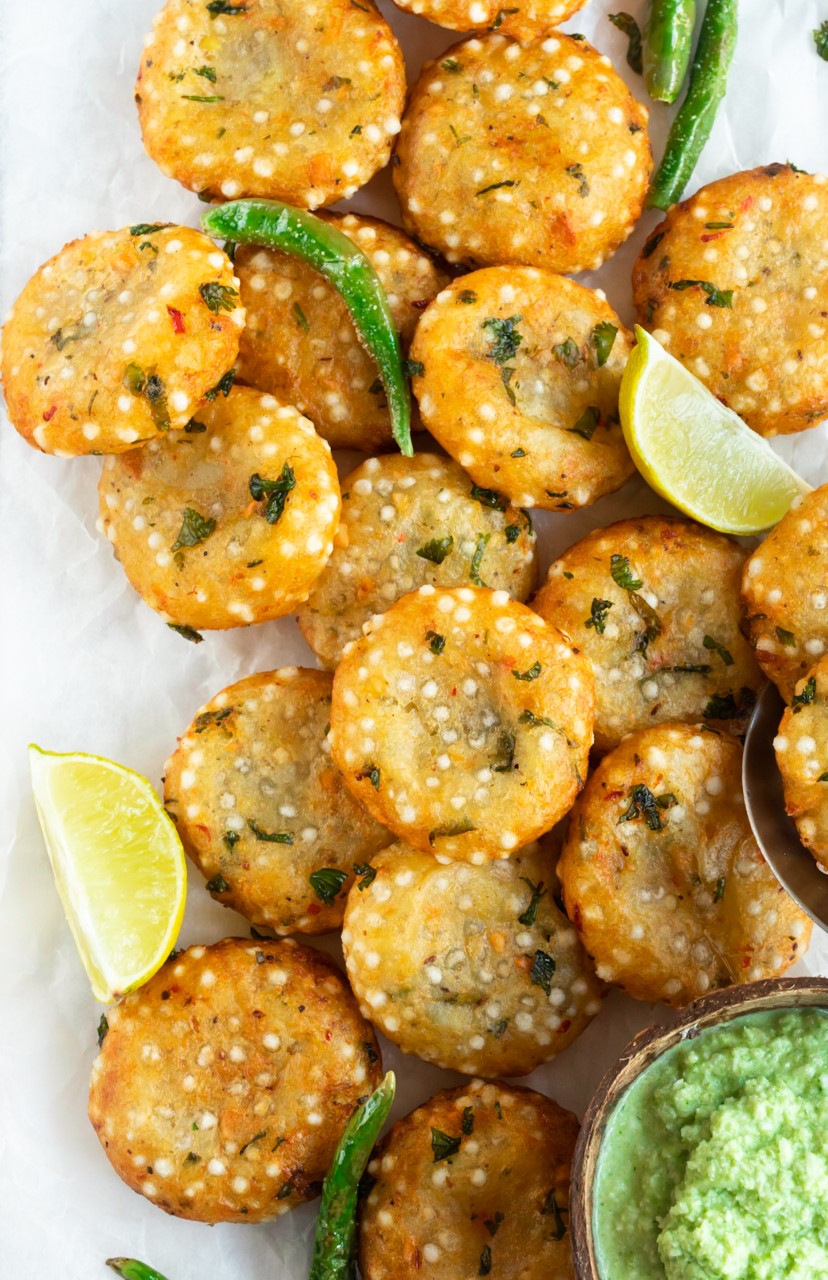
Sabudana Vada 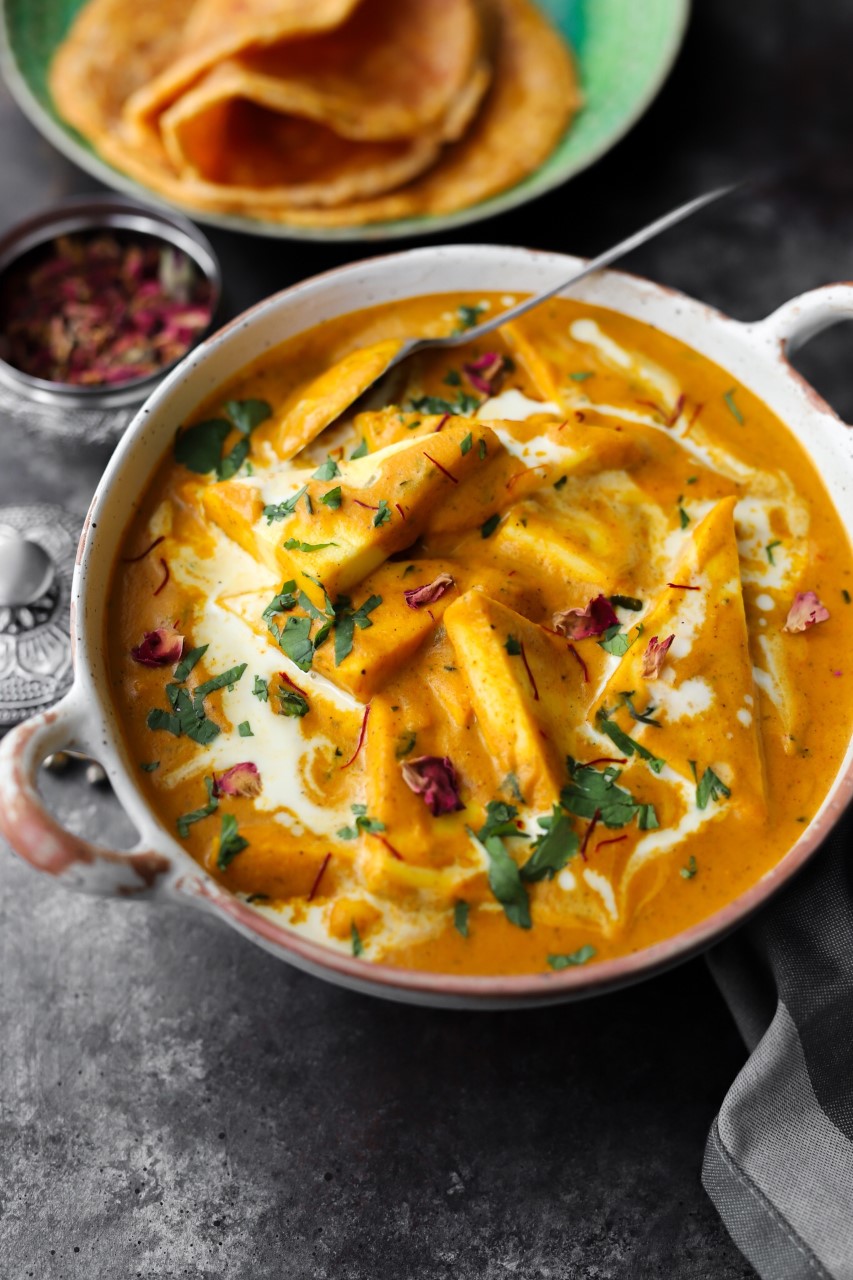
Shahi Paneer
I began by filming some of the Indian sweets we cooked, and we just chatted as we normally would when we cooked together. I uploaded the videos to my Instagram, thinking it might be interesting to someone, somewhere. The feedback I received was off the scale. My inbox was inundated with messages from people saying they had always loved these dishes, but had never learnt how they were made. Some of them wished they had.
“For now, I’m working on just being.”
And thus, I found my purpose. I began filming Indian soul food recipes in my series Cue the Comfort Food on Instagram in January 2020. It was for the people who had always wanted to learn how to cook Indian food, but for various reasons, hadn’t. I explore both traditional Indian and Indian fusion (not a dirty word in my book) recipes in detail, step by step, with full explanations for why we do things a certain way as well as offer tips. Since then, I’ve had hundreds of messages and photos every week from people who are cooking the recipes I share. I still have my “lost” moments and feel nervous about the future, but at least I feel more connected with the things I have control over and what I can do to make a difference.
If all of this has taught me anything, it’s to trust in yourself to do what needs to be done, when it needs to be done. I’m learning that I don’t need to have my entire life mapped out, for my circumstances may change tomorrow. For now, I’m working on just being.
What do success and happiness look like for you and why, and has this changed over time?
My touchstone for success begins and ends with whether I’m making a positive difference in people’s lives, however big or small. For example, I have an ambition to write a cookbook. When I do, it will be something I put my whole self into. Success would be if people actually read it. I don’t want to write a book nobody will read, cook recipes nobody will recreate at home or that my family don’t enjoy. My happiness lies in knowing I’m doing the best job I possibly can for myself, for my family and for my audience. This was the case with the first wonky rotis I rolled for my dad when I was a little girl. It’s just now my rotis are rounder and my dad’s expectations are higher!
All photos are courtesy of Sanjana Modha-Patel.
If you enjoyed this interview with Sanjana Feasts, you can find the rest of the Spotlight on Chefs series here.
LINKS
Sanjana Feasts, Aloo Paratha recipe, Gulab Jamun Cake recipe, Gujarati Daal Dhokli, Asma Khan Interview, Romy Gill Interview, Vivek Singh Interview
PIN FOR LATER

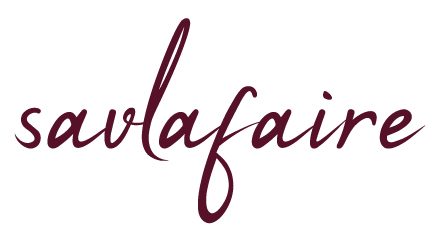
I love Sanjana and her cooking! That khandvi recipe of hers is amazing. Also totally agree to the no measurement recipes – I have picked that up from my mum and now when I cook to write up the recipes I have to be mindful of what I am doing. Lovely interview Seetal
Author
She’s just amazing in so many ways. I love her honesty, passion and mission, as well as her beautiful photography and recipes! My mum and gran are the same in that they don’t weigh or measure ingredients either – they just know and can’t explain it. They use their senses to guide them. Thanks for taking the time to read the interview, Neha – glad you enjoyed it.
Wonderful interview, Seetal! Really enjoyed hearing Sanjana’s stories and experiences, and how they’ve motivated her to do what she loves doing. The part about her grandmother trying to convey her recipes really resonated – I remember asking my grandma about how to do her fluffy ‘chremsel’ pancakes, and it was all “a spot of this, a dash of that, and enough matzo meal until it reaches this (nebulous) consistency!” Thanks again!..
Author
I think most grandmothers cook this way by the sounds of things! It’s a joy to watch them bring all the ingredients together, but so frustrating if you want to replicate them later down the line as Sanjana says. Really pleased that you enjoyed this interview, Aaron, and look forward to seeing your Indian dishes soon 😉
This is a fantastic interview Seetal and can resonate with a lot Sanjana is talking about. I don’t think I’ve ever weighed out any Indian recipe ingredients before, much to my husbands annoyance when he wants to recreate dish and I’m away! My gran will always say its a secret but I know it’s not for teh same reasons as Sanjana said. As I’m vegetarian and do sway towards vegan options, Sanjana has the perfect recipe options and her creativity is incredible. I’m quite new to her cooking but definitely will be having ago at some of them.
Author
Thanks so much for reading, Bejal – I’m so pleased that you enjoyed these insights into Sanjana life and approach to cooking. It seems that most grandmothers and mothers cook this way – it comes down to working with their senses and years of experience. I can barely cook for more than 4 people, so whenever I used to watch my gran and mum make meals for large family functions, the amount of ingredients and spices floating around would freak me out! Sanjana’s recipes are a treasure trove for all Indian food lovers, especially vegetarians and vegans. They all look so enticing in different ways. I look forward to seeing your versions soon!